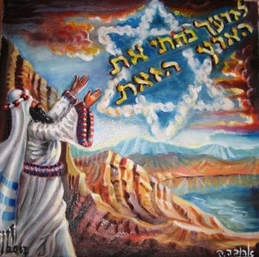
I will plant Israel in their own land, never again to be uprooted from the land I have given them”
~ Amos 9:15
Some 3,500 years ago the Canaanites inhabited the land that God promised to give to the offspring of Abraham, Isaac and Jacob. God promised that He would give the land of Israel to the Jewish people as an eternal possession. The promise was unconditional. God confirmed it at least 55 times with an oath and stated at least 12 times that the covenant was everlasting.
God did bring the Israelites into the Promised Land forty years after the Exodus from Egypt. Israel reached the peak of her power some 500 years later under King Solomon.
Israel is a small country, covering roughly 8,000 square miles and home to 8.65 million people. But it plays a disproportionately large role on the world stage — a function of its longstanding conflict with its Arab neighbors, its vast accomplishments in the high-tech sector and its religious significance for the world’s three monotheistic religions. And while its population is overwhelmingly Jewish, it is also extremely diverse, representing a wide range of religious and ethnic identities.
History
The modern state of Israel was founded by a United Nations resolution in 1948. However, the Jewish connection to the land of Israel goes back to biblical times, continuing through the periods of the First and Second Temples. While the Jewish people scattered all over the world following the destruction of the Second Temple in 70 CE, Israel continued to be a spiritual and cultural focal point.
Israel’s establishment as a modern Jewish state came about as a result of Zionism, a political and cultural movement whose aim was bringing the Jewish people to the land of Israel where they could rule themselves and be safe from anti-Semitism. In the decades before Israel’s founding, when the land was under Ottoman and then British rule, hundreds of thousands of Jews emigrated from other countries to settle there.
Demographics
Seventy-five percent of Israel’s citizens are Jewish, and 25 percent are non-Jews, of which most are Arab. Since its founding, Israel has welcomed millions of Jewish immigrants from all over the world, with large immigration waves from Europe in the late 1940s, from North Africa and the Middle East in the 1950s, from Ethiopia in the 1980s and ’90s and from the former Soviet Union in the ’90s. All Jews who settle in Israel are entitled to citizenship under the Law of Return.
Religious Outlook of Israeli Jews (Self-Identified)
Secular: 43 percent
Traditional: 37 percent
Religious (Orthodox): 11 percent
Haredi (Ultra-Orthodox): 9 percent
~ Amos 9:15
Some 3,500 years ago the Canaanites inhabited the land that God promised to give to the offspring of Abraham, Isaac and Jacob. God promised that He would give the land of Israel to the Jewish people as an eternal possession. The promise was unconditional. God confirmed it at least 55 times with an oath and stated at least 12 times that the covenant was everlasting.
God did bring the Israelites into the Promised Land forty years after the Exodus from Egypt. Israel reached the peak of her power some 500 years later under King Solomon.
Israel is a small country, covering roughly 8,000 square miles and home to 8.65 million people. But it plays a disproportionately large role on the world stage — a function of its longstanding conflict with its Arab neighbors, its vast accomplishments in the high-tech sector and its religious significance for the world’s three monotheistic religions. And while its population is overwhelmingly Jewish, it is also extremely diverse, representing a wide range of religious and ethnic identities.
History
The modern state of Israel was founded by a United Nations resolution in 1948. However, the Jewish connection to the land of Israel goes back to biblical times, continuing through the periods of the First and Second Temples. While the Jewish people scattered all over the world following the destruction of the Second Temple in 70 CE, Israel continued to be a spiritual and cultural focal point.
Israel’s establishment as a modern Jewish state came about as a result of Zionism, a political and cultural movement whose aim was bringing the Jewish people to the land of Israel where they could rule themselves and be safe from anti-Semitism. In the decades before Israel’s founding, when the land was under Ottoman and then British rule, hundreds of thousands of Jews emigrated from other countries to settle there.
Demographics
Seventy-five percent of Israel’s citizens are Jewish, and 25 percent are non-Jews, of which most are Arab. Since its founding, Israel has welcomed millions of Jewish immigrants from all over the world, with large immigration waves from Europe in the late 1940s, from North Africa and the Middle East in the 1950s, from Ethiopia in the 1980s and ’90s and from the former Soviet Union in the ’90s. All Jews who settle in Israel are entitled to citizenship under the Law of Return.
Religious Outlook of Israeli Jews (Self-Identified)
Secular: 43 percent
Traditional: 37 percent
Religious (Orthodox): 11 percent
Haredi (Ultra-Orthodox): 9 percent

